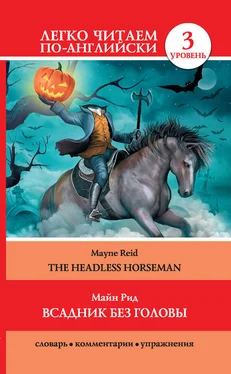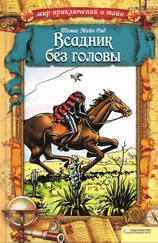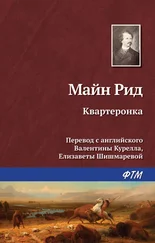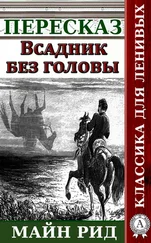The tone of the speaker was now close bordering upon terror – as was also the expression of his countenance.
The look and attitude of the staghound were not very different. He stood a little in advance with eyes glaring wildly, while fixed upon the approaching horseman.
Then, as if urged by some canine instinct, he bounded off towards the strange object. Rushing straight on, he gave utterance to a series of shrill yelps; far different from the soft sonorous baying, with which he was accustomed to welcome the coming home of the mustanger.
As the dog drew near, still yelping as he ran, the blood-bay – which Phelim had long before identified as his master’s horse – turned sharply round, and commenced galloping back across the plain!
While performing the wheel, Phelim saw – or fancied he saw – that, which not only astounded him, but caused the blood to run chill through his veins, and his frame to tremble to the very tips of his toes.
It was a head – that of the man on horseback; but, instead of being in its proper place, upon his shoulders, it was held in the rider’s hand, just behind the pommel of the saddle!
Phelim saw no more. In another instant his back was turned towards the plain; and, in another, he was rushing down the ravine, as fast as his enfeebled limbs would carry him!
Answer the following questions:
1) Who were the four horsemen? Who was their leader? Where were they going?
2) What made Miguel Diaz leave the tavern in a hurry?
3) Who had visited El Coyote at night? How did he know about it?
4) Who was the man that lay in the chapparal? What had happened to him?
5) Why did Phelim ascend the bluff? What scared him so much?
There is no sound within the hut of Maurice the mustanger. Midnight has arrived, with a moon that assimilates it to morning. Passing through the alternations of light and shadow – apparently avoiding the former, as much as possible – goes a group of mounted men.
Though few in number – as there are only four of them – they are formidable to look upon.
They are in the war costume of the Comanche. Their paint proclaims it. There is the skin fillet around the temples, with the eagle plumes stuck behind it. The bare breasts and arms; the buckskin breech-clouts. [44]
They are closing in upon the hut, where lies the unconscious inebriate. The jacale [45]of Maurice Gerald is evidently their destination.
They dismount at some distance from the hut, securing their horses in the underwood, and continue their advance on foot.
Their stealthy tread and the precaution to keep inside the shadow proclaim design, to reach the jacale unperceived by whoever may chance to be inside it.
The four Comanches steal up to the door. It is shut; but there are chinks at the sides. To these the savages set their ears and stand silently listening.
No snoring, no breathing, no noise of any kind!
“It is possible,” says their chief – speaking in a whisper, but in good grammatical Spanish, “just possible he has not yet got home; though by the time of his starting he should have reached here long before this.”
The chief goes to the shed to find out if the horse is there. Six seconds suffice to examine the substitute for a stable. No horse in it.
“He’s not here, nor has he been this day!” he exclaims.
The savages decide to go inside and make sure. They enter the hut and see a man lying in the middle of the floor!
“Is he asleep?”
“He must be dead not to have heard us?”
“Neither,” says the chief, after examining him, “only dead drunk! He’s the servitor of the Irishman. I’ve seen this fellow before.”
The master of the house must come home, some time or other. An interview with him is desired by the men, who have made a call upon him. The chief is especially anxious to see him.
What can four Comanche Indians want with Maurice the mustanger?
Their talk discloses their intentions: for among themselves they make no secret of their object in being there. They have come to murder him!
Their chief will gain a thousand dollars by the deed – besides a certain gratification independent of the money motive. The others are only his instruments and assistants.
The travesty need not be carried any further. Our Comanches are mere Mexicans; their chief, Miguel Diaz, the mustanger.
“He cannot be much longer now, whatever may have detained him. You, Barajo, go up to the bluff, and keep a look-out over the plain. The rest remain here with me. He must come that way from the Leona. We can meet him under the big cypress tree. Take your stand at the top of the gorge. From that point you have a view of the whole plain. He cannot come near without your seeing him, in such a moonlight as this. As soon as you’ve set eyes on him, hasten down and let us know.”
Barajo obeys, and, stepping out of the jacale, proceeds to his post upon the top of the cliff.
The others seat themselves inside the hut. A pack of Spanish cards is soon displayed upon the table. Absorbed in calculating the chances of the game, an hour passes without note being taken of the time.
All at once a stertorous sound interrupts the play, causing a cessation of the game.
It is the screech of the inebriate, who, awaking from his trance of intoxication, perceives for the first time the queer company that share with him the shelter of the jacale.
The players spring to their feet, and draw their ma-chetes.
Phelim is only saved by a contingency – another interruption that has the effect of staying the intent.
Barajo appears in the doorway panting for breath.
“He is coming – on the bluff already – quick, comrades, quick!”
In a score of seconds they are under the cliff. They take stand under the branches of a spreading cypress; and await the approach of their victim.
“Don’t kill him!” mutters Miguel Diaz to his men, speaking in an earnest tone. “I want to have him alive – for the matter of an hour or so. I have my reasons. Lay hold of him and his horse. If there is resistance, we must shoot him down; but let me fire first.”
Soon he for whom they are waiting has accomplished the descent of the slope, and is passing under the shadow of the cypress.
“Down with your weapons. To the ground!” cries El Coyote, rushing forward and seizing the bridle, while the other three fling themselves upon the man who is seated in the saddle.
There is no resistance, either by struggle or blow; no shot discharged: not even a word spoken in protest!
The horse alone shows resistance. He rears upon his hind legs, makes ground backward, and draws his captors after him.
He carries them into the light, where the moon is shining outside the shadow.
Merciful heaven! what does it mean?
His captors let go their hold, and fall back with a simultaneous shout. It is a scream of wild terror!
Not another instant do they stay under the cypress; but commence retreating at top speed towards the thicket where their own steeds have been left tied.
Mounting in mad haste, they ride rapidly away.
They have seen that which has already stricken terror into hearts more courageous than theirs – a horseman without a head!
***
Was it a phantom? Surely it could not be human?
So questioned El Coyote and his terrified companions. So, too, had Phelim interrogated himself, until his mind, clouded by repeated appeals to the demijohn, became temporarily relieved of the terror.
In a similar strain had run the thoughts of more than a hundred others, to whom the headless horseman had shown himself – the party of searchers who accompanied the major.
Читать дальше
Конец ознакомительного отрывка
Купить книгу








